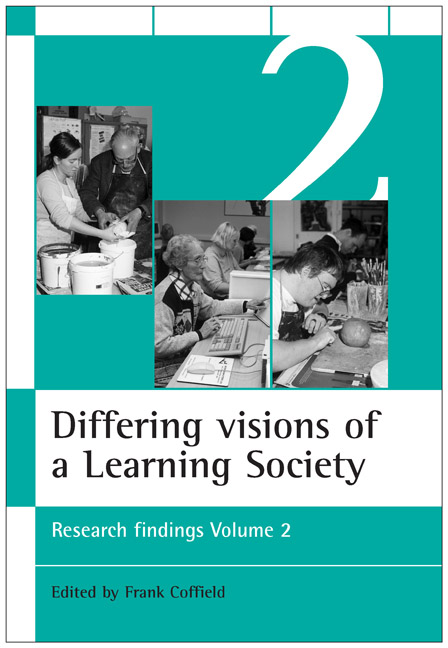Book contents
- Frontmatter
- Contents
- Notes on contributors
- Dedication
- The three stages of lifelong learning: romance, evidence and implementation
- one The meaning of the Learning Society for adults with learning difficulties: bold rhetoric and limited opportunities
- two Networks, norms and trust: explaining patterns of lifelong learning in Scotland and Northern Ireland
- three Learning culture, learning age, learning society: turning aspirations into reality?
- four Teaching and learning in higher education: issues of innovation
- five Participating in the Learning Society: history, place and biography
- six Skills in the British workplace
- Index
- The Learning Society series
The three stages of lifelong learning: romance, evidence and implementation
Published online by Cambridge University Press: 05 July 2022
- Frontmatter
- Contents
- Notes on contributors
- Dedication
- The three stages of lifelong learning: romance, evidence and implementation
- one The meaning of the Learning Society for adults with learning difficulties: bold rhetoric and limited opportunities
- two Networks, norms and trust: explaining patterns of lifelong learning in Scotland and Northern Ireland
- three Learning culture, learning age, learning society: turning aspirations into reality?
- four Teaching and learning in higher education: issues of innovation
- five Participating in the Learning Society: history, place and biography
- six Skills in the British workplace
- Index
- The Learning Society series
Summary
Introduction
Is lifelong learning the big idea which will deliver economic prosperity and social justice, or will it prove to be yet another transient phenomenon like ‘recurrent education’ which came and went during the 1970s? The European Commission has chosen lifelong learning as the overarching concept which, it is hoped, will weld together in one policy both active citizenship and the knowledge economy. On the other hand, lifelong learning is so seriously under-theorised and under-researched that it seems a rather underdeveloped candidate to play the role of panacea for the economic and democratic problems of Europe.
It may be helpful to picture lifelong learning as currently making its way through three overlapping stages, namely, those of romance, evidence and implementation. For at least the last 20 years the concept has been stuck in the first pre-scientific phase, where, for example, ‘vital, vibrant and vigorous’ disciples listen to ‘visionary’ leaders who preach the new theology of lifelong learning at meetings which are no longer called conferences but ‘festivals’1 of learning (Longworth and Davies, 1996; Longworth, 1999). Self-styled ‘learning philosophers’ bring ‘glad tidings of a feast’ (Agenda for the First European Festival of the Learning City) and recite litanies of ‘learning beatitudes’, or learning platitudes as they should be called, to the faithful. The book by Norman Longworth and Keith Davies (1996) and the sequel by Norman Longworth (1999) include 17 of such beatitudes which are to be “emblazoned on the walls of every classroom, common room and workplace” (1996, p 24); some restraint will be shown in quoting only four of them, two from each book:
Learning brings change – the Renaissance changed a civilisation. Today learning is transforming an empire in Eastern Europe. (1996, p 23)
Learning pays … the education and training of [the] workforce is the single most important characteristic in determining economic performance. (1996, p 24)
Learning empowers – it makes possible the realisation of our dreams. (1999, p 11)
Learning nourishes – it gives vitality to our hunger to know and to wonder. (1999, p 11)
The faithful at such celebrations of learning can be imagined chanting the recommended mantras of “Learning is not teaching”, “Education and training are dead” and, of course, “Learning can be fun”.
- Type
- Chapter
- Information
- Differing visions of a Learning Society Vol 2Research Findings, pp. 1 - 48Publisher: Bristol University PressPrint publication year: 2000



